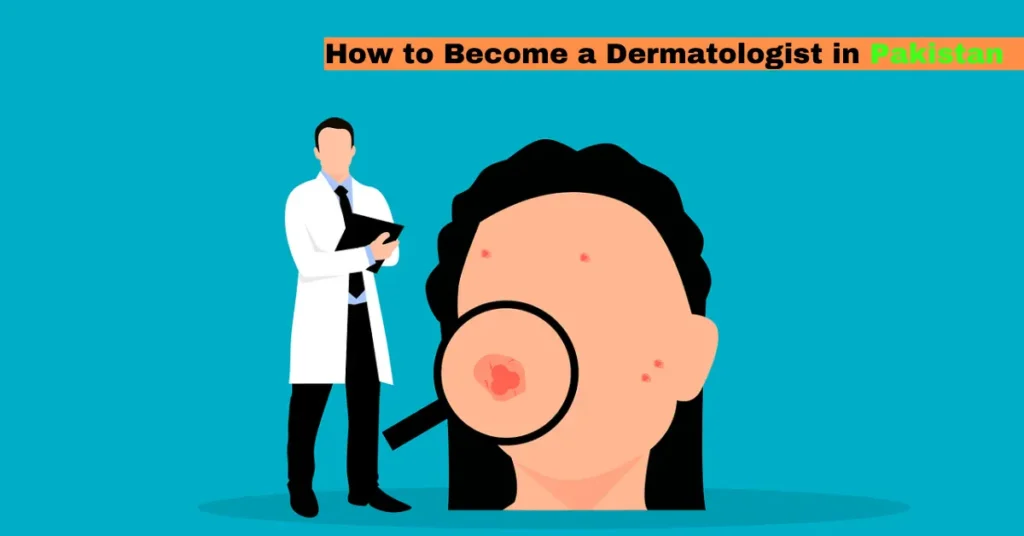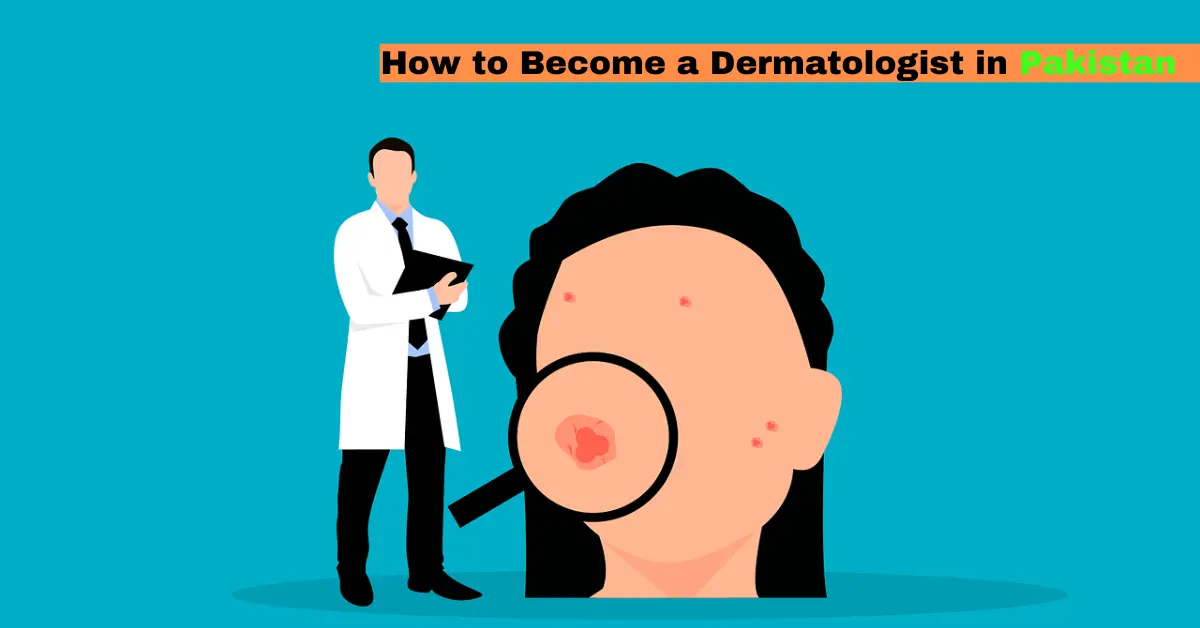Welcome to the world of dermatology in Pakistan: If you’ve ever been curious about the path to becoming a dermatologist and the exciting opportunities this field offers you’re in the place.

This article serves as your guide outlining the steps, educational pathways, and various specializations within dermatology. We will explore the roles of dermatologists. Delve into their scope both in Pakistan and internationally. Whether you are a student, an individual, or someone contemplating a career change get ready as we embark on this enlightening journey together!
What is a Dermatologist?
A dermatologist is a doctor, with expertise in diagnosing and treating skin related conditions. Their role is essential, in preserving the health of the skin and addressing any concerns that may affect a person’s appearance and overall well being.
Responsibilities and Duties of Dermatologists
Dermatologists undergo training to address a range of skin related issues. They carefully examine patients make diagnoses, for skin conditions and develop treatment plans. In addition, they may also carry out procedures, like skin surgeries and cosmetic treatments to effectively target concerns.
Becoming a Dermatologist in Pakistan
Becoming a dermatologist in Pakistan requires following a defined path. Now let’s break down the steps to make this process easier to understand.
Educational Pathway
Matric and F.Sc Pre-Medical
The first step is completing Matriculation with a focus on Biology. Following this, pursued a pre-medical education in F.Sc, emphasizing subjects like Biology, Chemistry, and Physics.
MDCAT Preparation
Get ready, for the Medical and Dental College Admission Test (MDCAT). Achieving a score in this examination is extremely important if you want to secure admission to colleges.
Medical College Application
Apply to a recognized medical college in Pakistan. The admission process is competitive, and acceptance is based on your MDCAT scores and academic performance.
5-Year MBBS Study
Embark on a five year expedition to acquire your MBBS degree encompassing an exploration of medical fields. This educational voyage will lay the groundwork for your expertise and specialization in medicine.
Specialization in Dermatology
Dermatology Courses in Pakistan
Once you have finished your MBBS degree you have the opportunity to pursue a specialization in dermatology. Several universities in Pakistan provide courses in dermatology that enable you to enhance your knowledge and expertise in the field of skin disorders.
Dermatology Courses without MBBS
If you have an interest in dermatology but don’t hold an MBBS degree there are routes at certain universities. For example, you may consider pursuing a Bachelor of Science (BS) degree in Dermatology as an option.
BS Dermatology: Guide, Majors, Duration, and Credit Hours
For those taking the BS Dermatology route, this section provides comprehensive information on majors, duration, credit hours, and the scope of the program.
Specialties within Dermatology
In the field of dermatology, there are areas of specialization including dermatopathology, Mohs surgery, and pediatric dermatology. Understanding these specialties helps in choosing a focused career path.
Read also this is for you: How to Become a Cardiologist in Pakistan – Heart Specialist
Types of Dermatologists
Dermatology is a diverse field, with dermatologists specializing in areas to cater to specific skin issues. Now let’s delve into the types of dermatologists and grasp their roles in offering care.
#1: Dermatopathologists
Dermatopathologists possess expertise in identifying skin diseases by examining tissue samples under a microscope. They collaborate closely with dermatologists and other medical professionals to ensure diagnoses enabling them to recommend the most suitable treatment strategies.
#2: Immune Dermatologists
Dermatologists who specialize in immune-related disorders primarily deal with skin conditions that are influenced by the system. Their area of expertise includes skin diseases. They work closely with immunologists to handle intricate cases.
#3: Tele Dermatologists
In today’s era, Tele Dermatologists utilize state-of-the-art tools to offer remote consultations. They make use of platforms to diagnose and treat a range of skin conditions providing convenience to patients who may face challenges in accessing a physical dermatology clinic easily.
#4: Pediatric Dermatologists
Specialists in Pediatric Dermatology focus on treating skin problems in children. They provide care for a range of dermatological conditions, including common ones, like eczema and rare skin disorders that affect young patients specifically.
#5: Mohs Surgeons
Mohs surgeons are experts, in a highly efficient procedure known as surgery. This technique is commonly employed for the removal of skin cancer aiming to minimize damage, to tissues while effectively eliminating cells.
Dermatology Courses and Specializations
Now that we’ve covered the kinds of dermatologists let’s take a look, at the educational journey to becoming a dermatologist. In this section, we’ll discuss the courses and areas of expertise that individuals can pursue if they have aspirations to specialize in dermatology.
Certificate Dermatology Courses
Certificate courses provide focused knowledge in dermatology. The General Dermatology Professional Certificate is a rounded program that addresses subjects making it ideal for medical practitioners looking to enhance their expertise in dermatology.
Diploma Dermatology Courses
Diploma programs provide students with an opportunity to delve deeper into the field of dermatology. The Diploma, in Dermatology, Venereology and Leprosy is a course designed to equip students with skills for addressing various skin conditions as well, as venereal and leprosy-related ailments.
Post-Graduate Course Options
After finishing their MBBS degree individuals who aspire to become dermatologists have the option to further their education by pursuing a postgraduate degree, in dermatology. This specialized program focuses on the diagnosis and treatment of skin disorders.
MD in Dermatology, Venereology & Leprology
The MD program is a postgraduate course that primarily focuses on dermatology, venereology and leprology. This advanced qualification enables individuals to excel in the field of dermatology and become dermatologists.
NEET PG Exam Details
The NEET PG examination holds importance for individuals aspiring to pursue studies in dermatology. It is crucial to comprehend its intricacies and prepare adequately to increase the chances of gaining admission into institutions.
Budding dermatologists have opportunities to consider enabling them to select the path that best fits their career aspirations. In the following section, we will delve into the potential of pursuing a career, in dermatology and highlight some of the leading universities in countries such, as the United Kingdom, the United States of America, Canada and Australia.
Dermatology Abroad
If you’re thinking about expanding your horizons and exploring a career in dermatology outside of Pakistan this section delves into the possibilities that exist in countries such as the United Kingdom, the United States of America, Canada and Australia.
- Dermatology in the United Kingdom
The United Kingdom provides establishments for individuals aspiring to become dermatologists. Renowned universities such as the University of Manchester and the University of Edinburgh offer programs and extensive training in the field of dermatology.
- Dermatology in the United States of America
The United States is known for its schools that have excellent dermatology programs. Institutions such as Harvard Medical School and Johns Hopkins University are highly regarded for providing top notch education in the field of dermatology.
- Dermatology in Canada
Canada’s medical education system is highly regarded. Universities like the University of Toronto and the University of British Columbia offer comprehensive dermatology programs for aspiring dermatologists.
- Dermatology in Australia
Australia boasts reputable institutions such as the University of Melbourne and the University of Sydney. These universities provide excellent opportunities for individuals aspiring to become dermatologists.
By exploring these opportunities aspiring dermatologists can broaden their horizons. Gain a global perspective, on their career path. In the following section, we will discuss the skills to succeed in the field of dermatology and the top employers who value these skills when hiring prospective dermatologists.
Skills and Qualities Required
Achieving success as a dermatologist involves more than having academic credentials. In this segment, we will discuss the abilities and attributes that individuals should develop in order to thrive in the field of dermatology.
Essential Skills for Dermatologists
Medical Knowledge
Having an understanding of knowledge is essential. Dermatologists need to have a grasp of skin conditions what causes them and the most effective treatments available.
Communication Skills
Good communication is crucial when engaging with patients. Dermatologists have to explain details in a way that is easy to understand making sure that patients are well informed and at ease.
Observation Skills
Dermatologists heavily rely on their observation skills to accurately diagnose skin conditions. It is crucial for them to be able to detect subtle changes and patterns in order to make precise assessments.
Empathy and Compassion
Showing empathy and compassion is essential when interacting with patients who may be experiencing distress due, to their skin conditions. Dermatologists should handle each case with care, sensitivity, and a deep understanding of the patient’s emotions.
Top Recruiters for Dermatologists
Hospitals and Clinics
Large hospitals and specialized dermatology clinics are major employers for dermatologists. These settings offer diverse cases and opportunities for career growth.
Research Institutions
Research institutions often employ dermatologists to contribute their expertise and insights to the advancement of knowledge and the development of discoveries and innovations.
This collaboration between research institutions and dermatologists plays a role in pushing the boundaries of our understanding in the field.
Pharmaceutical Companies
Dermatologists are frequently approached by companies to participate in aspects of dermatological treatment development, testing and marketing.
Career Scope and Opportunities

Dermatology offers a range of career paths allowing professionals to find satisfying roles, in sectors. In this section, we will delve into the range of career opportunities and job prospects that dermatologists can explore.
Employment Sectors
Hospitals and Clinics
Dermatologists find employment in hospitals and clinics. They play a role in both private healthcare settings, where they diagnose and provide treatment for various skin ailments ensuring that patients receive necessary medical care.
Private Practice
A lot of dermatologists opt to set up their practices, which gives them the freedom to run their clinics independently. This provides them with autonomy and the chance to develop a practice that caters to dermatological requirements.
Research and Academia
If you have an interest, in research and teaching dermatology provides opportunities within universities and research institutions. Dermatologists who pursue careers in academia play a role in advancing knowledge in the field while also guiding and mentoring generations of medical professionals.
Job Opportunities
Dermatologist
As a dermatologist people have the option to practice dermatology or specialize in fields like pediatric dermatology, cosmetic dermatology or dermatopathology.
Dermatopathologist
Dermatopathologists specialize in the analysis of skin diseases working in laboratories and collaborating with healthcare experts to ensure precise diagnoses.
Cosmetic Dermatologist
Dermatologists who specialize in procedures focus on enhancing the appearance of the skin by providing services such, as Botox, fillers and laser treatments.
Get more information: What is the Scope of MBBS in Pakistan: Career, Jobs and Salary
Benefits and Drawbacks of Being a Dermatologist
Deciding to pursue a profession, in dermatology brings both benefits and challenges that are worth considering. In the following section, I will provide a view, on the advantages and disadvantages of choosing a career as a dermatologist.
Benefits
Helping Others
As a dermatologist one of the things I find fulfilling is being able to assist individuals in overcoming skin conditions, which not only enhances their overall well being but also boosts their confidence.
Diverse Specializations
In the field of dermatology, there are specializations enabling professionals to concentrate on specific areas that match their interests and passions. These specializations include dermatology, cosmetic dermatology and dermatopathology.
Career Stability
The demand for dermatologists remains strong ensuring career prospects and room for development. Since skin problems are common there is a need, for dermatologists.
Drawbacks
Extensive Education and Training
Becoming a dermatologist requires undergoing education and training that spans over the years. The journey entails completing school specializing in the field of dermatology and often pursuing studies to further specialize in specific areas.
Intense Workload
Dermatologists often have to handle a workload in bustling hospitals or clinics. Dealing with a number of cases and addressing a range of patient concerns can be quite demanding.
Balancing Cosmetic Procedures
Dermatologists who focus on procedures often face the challenge of finding a ground, between medical and aesthetic aspects, which can raise ethical concerns.
Read more: Scope of Pharm D in Pakistan: Career, Jobs, Opportunities
Procedures and Techniques in Dermatology
Dermatologists use a range of methods and approaches to identify and treat skin conditions. In this section, we will delve into the procedures, in dermatology providing insights, into the aspects of this field.
Electrosurgery
Electrosurgery is a technique that utilizes electrical currents to perform various tasks such, as cutting, coagulating and removing tissue. Dermatologists frequently employ electrosurgery to address concerns like removing warts or treating cancerous skin growths.
Cryosurgery
Cryosurgery is a procedure that involves using low temperatures often with the help of liquid nitrogen to freeze and eliminate abnormal tissues. This method is frequently used for removing warts, skin tags and precancerous lesions.
Laser Surgery
Laser surgery utilizes light to eliminate or alter tissues. Dermatologists employ lasers, for a range of applications, such as eliminating hair erasing tattoos and addressing skin issues, like scars.
Excision Surgery
Excision surgery is a procedure that involves the removal of skin growths, such, as lesions, tumors or cysts. Dermatologists often perform excision surgery to treat types of skin conditions whether they are benign or malignant.
Mohs Surgery
Mohs surgery is a method used to treat skin cancer, especially in areas where it is essential to preserve healthy tissue. Dermatologists carefully remove layers of tissue. Examine each layer under a microscope until all cancer cells have been completely eradicated.
Mole Removal
Dermatologists often choose to remove moles for reasons, such as addressing issues or when there is a suspicion of potential malignancy. The process typically involves either cutting or shaving off the mole and in some cases a biopsy is performed to conduct examination.
Vein Treatment
Dermatologists have a range of treatments to deal with problems, like spider veins or varicose veins. These options can include laser therapy, sclerotherapy (where a solution is injected to make the collapse) or other procedures that are minimally invasive.
How to Become a Dermatologist in Pakistan: Step by Step

Becoming a dermatologist, in Pakistan requires following a path. In this section, we will outline the steps one can take to reach their goals.
#1: Opt Biology in Matric
The journey begins in Matriculation, where aspiring dermatologists should opt for Biology as a primary subject. Building a strong foundation in biological sciences sets the stage for future medical studies.
#2: Do Your F.Sc Pre-Medical
After Matric, pursue the Pre-Medical track in F.Sc, focusing on subjects like Biology, Chemistry, and Physics. This educational phase lays the groundwork for the medical field.
#3: Prepare for the MDCAT
The MDCAT, which stands for the Medical and Dental College Admission Test holds importance in securing admission to colleges. It is vital to dedicate time and effort towards preparing for this examination as it greatly impacts the chances of being accepted into a program.
#4: Apply to a Medical College
Once you’ve successfully cleared the MDCAT, apply to recognized medical colleges in Pakistan. Admissions are competitive, with selection based on MDCAT scores and academic performance.
#5: Study MBBS for 5 Years
Upon admission, embark on a five-year journey to earn your Bachelor of Medicine, Bachelor of Surgery (MBBS) degree. This period encompasses comprehensive medical education covering various disciplines.
#6: Specialize in Dermatology
Once individuals have finished their MBBS degree they have the option to focus on dermatology. They can choose to pursue studies in dermatology which will provide them with knowledge and practical experience in this field.
#7: Dermatology Courses in Pakistan
Discover the dermatology courses in Pakistan. Numerous universities provide postgraduate programs tailored to dermatology offering education for those aspiring to become dermatologists.
How to Become a Dermatologist without MBBS in Pakistan?
If someone doesn’t have an MBBS degree another option is to pursue a Bachelor of Science (BS) in Dermatology. This pathway provides an opportunity for individuals to enter the field without having a degree.
Understanding the scope of a BS in Dermatology in Pakistan helps individuals assess the opportunities available within this academic and professional path.
FAQs:
Yes, you need to study MBBS to become a dermatologist. It provides the necessary foundation for specialized training in skin-related conditions.
Admission requirements vary, but typically for BS Dermatology in Pakistan, a good academic record, especially in biology and related subjects, is essential. Check specific university criteria.
No, individuals with a BS in Dermatology are not typically called doctors. The title “doctor” is generally reserved for those with medical degrees like MBBS.
Biology is the best subject for dermatology. It forms the foundation for understanding the human body and skin, essential for pursuing a career in dermatology.
“Dermatologist” and “skin specialist” are often used interchangeably. Dermatologists are medically trained doctors specializing in skin, while a skin specialist may refer to various skincare professionals.
